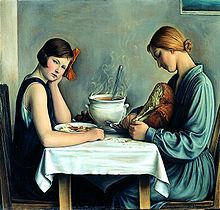François Barraud
François Barraud | |
|---|---|
 Self-portrait, 1931 | |
| Born | François-Emile Barraud 24 November 1899[1] |
| Died | 11 September 1934 (aged 34)[1] |
| Nationality | Swiss |
| Known for | Painting |

François Barraud (24 November 1899 – 11 September 1934) was a Swiss painter.[1][2]
Barraud was the second eldest of four brothers who all painted or sculpted at various points in their lives.[2] The brothers, François, Aimé, Aurèle and Charles, were largely self-taught artists having been raised as professional plasterers and house painters.[1][2] Barraud attended evening classes at the local art school in 1911 together with his brothers.[1] In 1919, he exhibited his paintings in La Chaux-de-Fonds and participated in the National Exhibition of Fine Arts in Basel.[3] Encouraged by the success of the exhibitions he left Switzerland in 1922, and moved to Reims in France where he worked as a house painter for two years.[1][3] He married Marie, a French woman, in 1924.[3][4] Marie subsequently featured as a model in several of his paintings.[3][4] Around 1924 or 1925, Barraud found work in Paris as an artist and craftsman.[4] While living in Paris he studied painting at the École du Louvre.[1][4]
François Barraud painted mainly still lifes, female nudes and portraits, including several double portraits of himself and his wife, Marie[2][5] His precise, realist style of painting developed under the influence of the old Flemish and French masters he had studied at the Louvre.[2]
Barraud suffered periods of illness throughout his life and died of tuberculosis in Geneva, in 1934, at the age of 34.[2]
Arthur Stoll held a major collection of François Barraud's works. His works are also held in the Musée des beaux-arts in La Chaux-de-Fonds, the Coninx Museum in Zurich and the Foundation for Art, Culture and History in Winterthur.
See also
[edit]References
[edit]- ^ a b c d e f g h Düchting, Hajo; Wieland Schmied; Hypo-Kulturstiftung (2001). Der kühle Blick: Realismus der Zwanzigerjahre in Europa und Amerika (in German). Prestel Verlag. p. 104. ISBN 3-7913-2513-2.
- ^ a b c d e f g h "François Barraud and his brothers" (in German). kunstaspekte. Retrieved 28 April 2010.
- ^ a b c d Crittin, Pierre-Jean (1998). "Datenblatt" (in French). Schweizerische Institut für Kunstwissenschaft (SIK-ISEA). Retrieved 7 May 2010.
- ^ a b c d "JAHRESBERICHT 2005 – 85. Jahresbericht des Kunstvereins Winterthur" (PDF) (in German). Kunstmuseum Winterthur. 15 May 2006. Archived from the original (PDF) on 4 August 2012. Retrieved 7 May 2010.
- ^ "Die Farben der Melancholie in der Neuenburger Malerei 1820-1940, von Léopold Robert bis François Barraud" (PDF) (in German). MAHN (Museum of art and history). 2004. Archived from the original (PDF) on 14 June 2011. Retrieved 6 May 2010.
